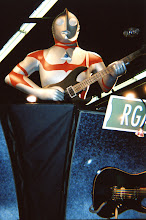
L.A. Times: Describe how you started working with Kanye West. And what do think it’s taken for you to be successful working with him prior to his latest album?
Andrew Dawson: When Kanye was halfway through "The College Dropout," he’d fired about six to eight engineers in about a month because they weren’t up to snuff, and it was eventually my turn to be next on the chopping block. I haven’t been fired since, seven or eight years later.
L.A. Times: How did you get involved with the "Fantasy" album, and what were some things you talked with Kanye about in terms of engineering and mixing it?
AD: "My Beautiful Dark Twisted Fantasy" pretty much started New Year’s Eve 2009. He flew everyone out to Hawaii the day before New Year's Eve ... and I remember on New Year’s Eve I was in the studio getting everything ready to go for the next day. And on Jan. 1, we were getting into the recording sessions and worked pretty much 24-7 for six months straight out of Hawaii. I literally would leave to go shower, change clothes and come back to the studio. There weren’t many beach days. But Kanye went through his process and worked on it solid for a good six to seven months.
But as far as engineering, there are certain sounds and certain production aspects that he really likes. If there’s a sound or an idea he wants, he’ll take it to, like, an extreme, to where you start to wonder, "Why is this so far out there?" Then he’ll pull it back to a perfect amount. He’s the master of knowing how to push things almost too far. ... I did some co-production on “Power.” I was the one who found that “21st Century Schizoid Man” sample and chopped it up.
L.A. Times: Where did that idea come from?
AD: Some random day I saw a T-shirt that reminded me of an album cover by King Crimson, and I went back and listened to that record. And Kanye and I were checking it out, and he ended up taking the sample and putting it in “Power.”
L.A. Times: What background or skill set do you bring to these kind of notable hip-hop artists that allows you to stand out in the production world?
AD: I’m a piano player, a guitar player and a songwriter, and I’m aware of all those aspects. So I can be different from other engineers where it’s purely a technical thing where they’re just trying to get the best sound. And I can sit back and say, "Yeah this sound is cool, but it doesn’t work with the arrangement. Maybe we should try it this way." I can anticipate a lot of times where an artist is wanting to go with a song and have arrangements and other things laid out before they even have to ask. It helps making their creativity flow as easy as possible.
L.A. Times: What aspects of the album really challenged your skills?
AD: Kanye wanted to do a complete departure from the standard format of hip-hop albums. The cool thing for me was that I got to throw out all of those pop conventions where we had to have a four-minute song and have a hook come in the first minute. It was very free-form working on the album. So the key thing was trying to capture it without getting in the way and trying to let [West] express his ideas as easy as possible.
L.A. Times: What’s it like seeing some of the projects you’ve done this year -- like Kanye’s “My Beautiful Dark Twisted Fantasy” and Drake’s “Thank Me Later” -- do as well as they have been given that you were behind the scenes helping to create them?
AD: It’s kind of cool for me to see people get excited about because it’s something I lived every day. So while the process is going on, I can feel the energy of how exciting and interesting it is, but it doesn’t really hit me until the album comes out. While I’m making the album I’m super critical and analytical and when it comes out, I’m like, "Now I can enjoy it" and be a bit detached from it.
L.A. Times: Where do you see yourself going next in terms of upcoming projects?
AD: I’ll be producing an album for P.O.S. He’s a friend of mine going all the way back to high school, and he just reached out to me earlier this year and said he wanted me to produce his entire album. So he and I are set to start working early in 2011 in L.A. to his follow-up album to “Never Better.” A lot of the mixes and the engineering I do are heavily production involved. I’ll do a lot of sound replacing or changing arrangements. I’ve worked on quite a few tracks as a producer, but sadly all of the artists on the label I worked with, nearly every one of them, were dropped or shelved. So I’m really excited to work with him on his album.
L.A. Times: Where does the "Fantasy" album fit in terms of career milestones for you as a sound engineer?
AD: This album puts the bar so high, working on such a creative album, it’s very interesting to see in my career what could top it. I’m not gonna say it couldn’t happen ... but it gives me a goal to work toward. (source)











